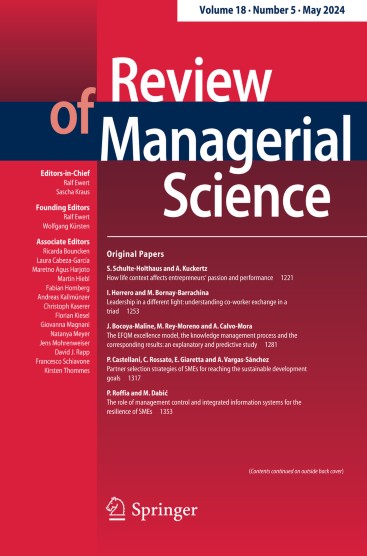套利和非线性税收
IF 9.6
3区 管理学
Q1 MANAGEMENT
引用次数: 0
摘要
摘要 将累进所得税纳入经济决策问题中会产生一个问题,即这种税是否不会产生套利机会。我们在无风险(多期)经济中研究了这一问题。通过凸税函数,我们确定了一种特殊的套利(称为有界套利):在这种情况下,通过套利交易获得的收益是有限的,不可能达到无穷大。我们能够根据交易资产的奖品给出有界套利机会和无界套利机会是否存在的完整特征。本文章由计算机程序翻译,如有差异,请以英文原文为准。
Arbitrage and non-linear taxes
Abstract
Incorporating a progressive income tax into an economic decision problem raises the question whether this tax does not create arbitrage opportunities. We investigate this problem in a riskless (multi-period) economy. With a convex tax function we identify a particular kind of arbitrage (called bounded arbitrage): In this case the gain achievable through arbitrage trade is limited and cannot reach infinity.We are able to give a complete characterisation based on prizes of the traded assets as to whether bounded as well as unbounded arbitrage opportunities will exist.
求助全文
通过发布文献求助,成功后即可免费获取论文全文。
去求助
来源期刊

Review of Managerial Science
MANAGEMENT-
CiteScore
11.30
自引率
14.50%
发文量
86
期刊介绍:
Review of Managerial Science (RMS) provides a forum for innovative research from all scientific areas of business administration. The journal publishes original research of high quality and is open to various methodological approaches (analytical modeling, empirical research, experimental work, methodological reasoning etc.). The scope of RMS encompasses – but is not limited to – accounting, auditing, banking, business strategy, corporate governance, entrepreneurship, financial structure and capital markets, health economics, human resources management, information systems, innovation management, insurance, marketing, organization, production and logistics, risk management and taxation. RMS also encourages the submission of papers combining ideas and/or approaches from different areas in an innovative way. Review papers presenting the state of the art of a research area and pointing out new directions for further research are also welcome. The scientific standards of RMS are guaranteed by a rigorous, double-blind peer review process with ad hoc referees and the journal´s internationally composed editorial board.
 求助内容:
求助内容: 应助结果提醒方式:
应助结果提醒方式:


